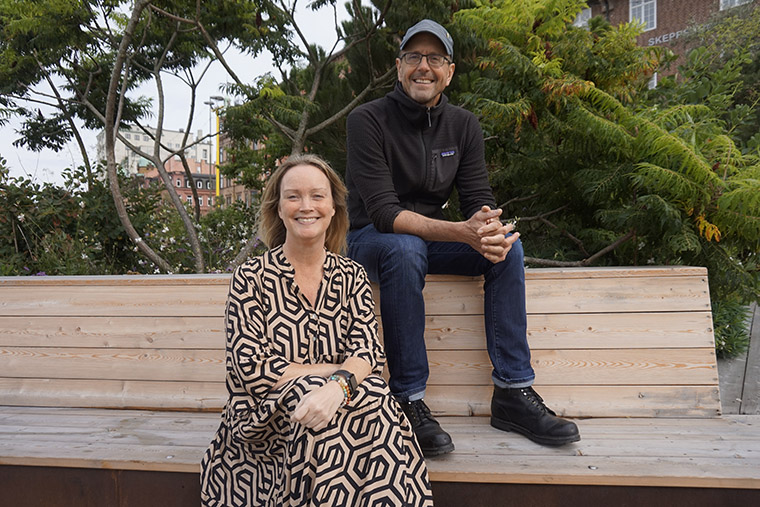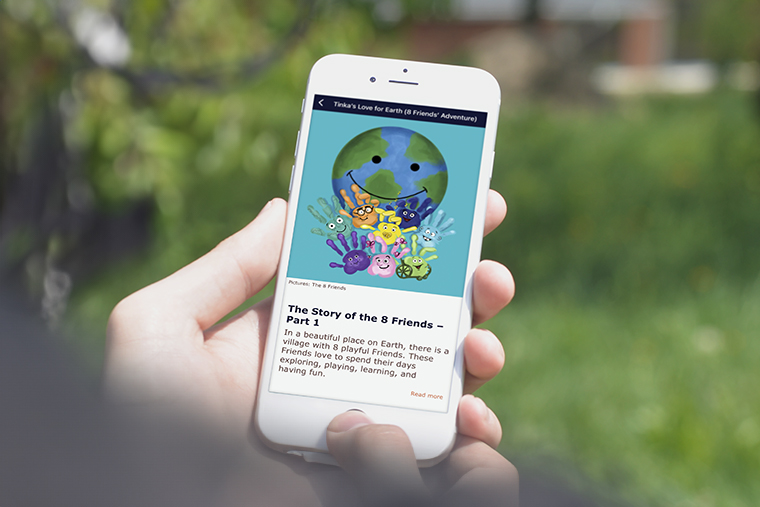“Children should have the chance to learn to love the world first!”
Five countries, an assortment of languages. Varying views on teaching and the environment. Is it even possible to develop a common course on sustainability for the preschool level that bridges these differences? The researchers behind the project “Sustainability from the Start” rose to the challenge, and their app is now being widely launched.
 According to researchers Marie Fridberg and Thomas Beery, sustainability is highly relevant in early education settings. The new app provides early childhood educators with a useful tool for working on sustainability with children.
According to researchers Marie Fridberg and Thomas Beery, sustainability is highly relevant in early education settings. The new app provides early childhood educators with a useful tool for working on sustainability with children.
Marie Fridberg and Thomas Beery, researchers in natural science didactics and environmental didactics respectively at Kristianstad University, are on their way to Aarhus, Denmark. There they will take a closer look at preschools that focus on outdoor education for an upcoming international research project. We are meeting at Malmö Central where they are changing trains.
It is clear that issues related to sustainability and education are close to their hearts. For the past two years, they have devoted a lot of time and effort to the international project “Sustainability from the Start”. This has resulted in the free ECE Academy app, recently launched in Swedish, English, Spanish, French, Croatian and Czech. The main target audience is early childhood educators around the world.
“Hopefully, with the help of the app, they will be able to recognise the good things they are already doing while also discovering new dimensions of sustainability,” says Marie Fridberg.
In the autumn of 2021, they were given funding through Erasmus+, and since then the team at Kristianstad University, consisting of Marie Fridberg, Thomas Beery and Susanne Thulin, associate professor of pedagogy, has been working intensively to bring the project to fruition.
A constructive collaboration
Project manager Marie Fridberg describes it as a good and constructive collaboration between the various partners: Kristianstad University, the international organisation OMEP, which involves early childhood educators in France, Ireland, Croatia, Sweden and the Czech Republic, and the technology company edChild, which develops online education apps.
However, designing an educational app that works in many different countries has presented some challenges. Languages and concepts have differed, as have views on how to integrate sustainability into education.
“We have noticed clear differences in teaching and conditions when we have visited different preschools in Europe, which has been instructive for those involved,” says Thomas Beery.
“The idea is for children and educators to explore and learn together.”
The app is divided into eight modules that in different ways highlight sustainability from an environmental, social and economic perspective. The researchers in Kristianstad took on the theme of “meeting global challenges and becoming a global citizen”. In this module, as in the others, concrete information for early childhood educators is interspersed with practical exercises for the children to do. One example is a map where children depict “my place in the world” using objects they have collected on a walk in their neighbourhood. Another is an exhibition of sustainable and unsustainable items the children have found indoors and out.
“The idea is for children and educators to explore and learn together, and to provide a holistic view of sustainability – that it permeates all activities,” says Marie Fridberg.
Emphasise joy

The app is divided into eight modules that in different ways highlight sustainability from an environmental, social and economic perspective.
Another challenge has been the underlying tone of the teaching material. In recent years, dealing with climate change and environmental degradation has become a serious issue for the survival of humanity. However, the researchers have been careful not to use a heavy tone or point fingers at either early childhood educators or children.
“Children should have the chance to learn to love the world before they have to save it.”
“It’s easy to fall into catastrophic thinking. But we want to emphasise joy. We don’t talk about ecological footprints, but the positive handprints we can make,” says Marie Fridberg.
Thomas Beery agrees: “Children should have the chance to learn to love the world before they have to save it.”
During the project, a reference group of around 20 early childhood educators from different countries tested the app and provided feedback and suggestions. Marie Fridberg describes running a large-scale Erasmus project as a fruitful experience.
“I have learnt a lot about how to work together to get the different stakeholders to move in the same direction.”
Since its release a month ago, the app has been downloaded 630 times, not only across Europe but also in countries such as Kenya and Australia.
“We've had a good amount of traffic,” says Marie Fridberg.
Reach many more
The next step is to adapt the app for use in early childhood education teacher training programmes, both in Sweden and internationally. The hope is that students will eventually be able to take a concrete way of thinking about sustainability with them when they start their professional lives.
“It’s exciting. Trying to teach sustainability to individuals, telling them what we should all do, is one thing. But by turning to those who teach, we have the opportunity to reach so many more people,” says Thomas Beery.
He describes the app as a toolbox that can be pulled out and used as and when the opportunity arises.
“Then, of course, we have to trust the individual teachers to adapt it to the teaching of their particular group of children and context,” he says.
“Sustainability is such a huge topic, and if this can get people interested, it’s a step in the right direction.”
Now their focus is turned on the international conference “Sustainability from the Start” which will be held in Kristianstad in April 2024, during which a presentation of their research project will be one of the main highlights. But even if this marks the end of the project, it does not mean that their work on sustainability is over.
“Sustainability is such a huge topic, and if this can get people interested, it’s a step in the right direction,” says Marie Fridberg.
